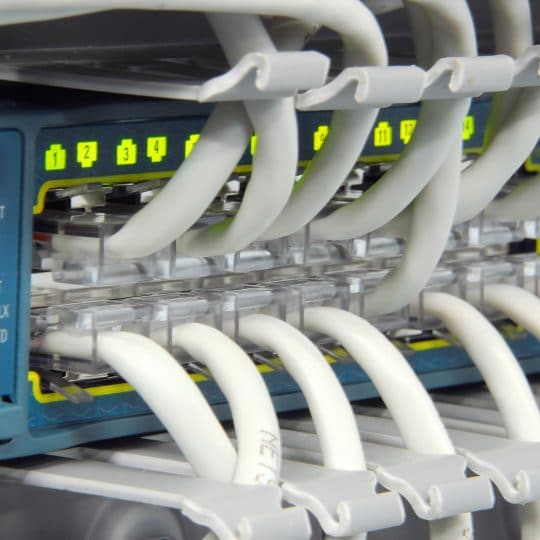Commercial Networking Services
Important Equipment and Terms

Keeping your business connected to the outside world is easier with the Internet and social media, but do you know how to keep your business connected internally? Commercial networking services helps the technology within the office—such as surveillance devices, phones, and computers—communicate with each other and connect to those who need the information. Certain equipment and terms are vital to the success of these services.
Commercial Networking Services Equipment
Make sure you have the necessary technology in place before installing a networking system:
- Cables. Wires that go from a device to a cable jack in your office.
- Adapters. Physical cards or plugs that connect computers to a network, allowing them to send and receive data. Older computers, TVs, and other devices may not have the proper connection cables, and will need a specific adapter to function.
- Ethernet. A transmission system that uses cables to communicate.
- Hub. A box equipped with RJ-45 ports for Ethernet cables.
- Routers. Used to connect the users within two or more networks. They also connect these networks to the Internet. Routers process and dispatch data through a device. Then information is routed to another network in a way that the receiving device is able to recognize.
- Switches. Connect the various devices within a building.
By creating a network in which printers, servers, and computers communicate, employees are able to share information.
Commercial Networking Service Lingo
While setting up your networking services, you may hear the following terms mentioned:
- IP Address. An acronym for “Internet Protocol address.” This is a number assigned to your device that allows other devices to communicate with it through their own IP addresses.
- ISP. An acronym for “Internet service provider.” This term refers to the company through which you purchase your Internet capabilities.
- LAN. Local Area Network.
- WAN. Wide Area Network. A WAN covers a wider area than a LAN.
Networking can get technical, with many other terms to learn and equipment to test. Many business owners consult a professional to set up their system to ensure it’s done right.
The team of experts at Security Five can help you setup, configure, and troubleshoot your network to keep you and your employees in constant contact and stay connected with day-to-day duties. Contact 610-323-9511 to learn more.